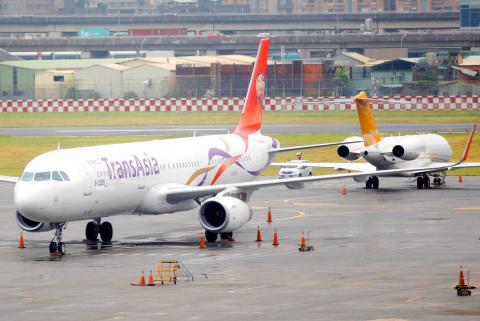TransAsia Airways Corp (復興航空) is negotiating with Airbus Group SE over the possibility of recovering NT$1.2 billion (US$37.57 million) it has made in down payments for 10 new aircraft, the carrier said yesterday.
TransAsia made the statement in response to speculation by some aviation industry insiders that as the company has announced its dissolution, it will lose the down payments for the new aircraft, which they estimated at NT$5 billion.
TransAsia placed orders for six A321neo aircraft in 2010 and four A330-800neo aircraft in 2014. They were scheduled to be delivered starting in 2018. The two models are officially priced at more than US$70 million and US$250 million respectively.

Photo: Reuters
According to the insiders, in an aircraft purchase deal, the manufacturer usually gives a discount to the buyer, but requires a large down payment equal to about one-third of the purchase price, which is usually kept secret.
In TransAsia’s case, the A330-800neos could have been bought at a discounted price of about US$100 million each, while the A321neos might have been sold at a discount of more than 50 percent, they said.
Based on this estimate, the down payments for the 10 aircraft would amount to NT$5 billion, they said.
However, TransAsia said that it had made a down payment of only NT$1.2 billion and that it was negotiating with Airbus in the hopes of getting the money back.
TransAsia on Tuesday announced that it would dissolve due to heavy losses, with all flight services terminated, effective immediately.
The airline posted a net loss of NT$2.22 billion and a loss per share of NT$3.42 in the first nine months of this year, with a gross margin of minus-18.76 percent.
TransAsia has a fleet of 27 aircraft, including 16 leased airplanes and 11 that it owns.
While the leased aircraft are to go back to their leasing companies, the purchased airplanes are to be sold to repay debts.
TransAsia shares fell for the third consecutive session on Friday to close at NT$3.80 on the Taiwan Stock Exchange (TWSE).
Analysts said there is no sign of the plunge ending soon, with orders to sell 81.75 million TransAsia shares still on the books after the market closed on Friday.
The airline is scheduled to hold a special general meeting on Jan. 11 for shareholders to vote on the closure decision, which would set the stage for a delisting from the market, the TWSE said.
Should that happen, a delisting is likely at the end of March after the airline completes all the necessary administrative steps.

The US dollar was trading at NT$29.7 at 10am today on the Taipei Foreign Exchange, as the New Taiwan dollar gained NT$1.364 from the previous close last week. The NT dollar continued to rise today, after surging 3.07 percent on Friday. After opening at NT$30.91, the NT dollar gained more than NT$1 in just 15 minutes, briefly passing the NT$30 mark. Before the US Department of the Treasury's semi-annual currency report came out, expectations that the NT dollar would keep rising were already building. The NT dollar on Friday closed at NT$31.064, up by NT$0.953 — a 3.07 percent single-day gain. Today,

‘SHORT TERM’: The local currency would likely remain strong in the near term, driven by anticipated US trade pressure, capital inflows and expectations of a US Fed rate cut The US dollar is expected to fall below NT$30 in the near term, as traders anticipate increased pressure from Washington for Taiwan to allow the New Taiwan dollar to appreciate, Cathay United Bank (國泰世華銀行) chief economist Lin Chi-chao (林啟超) said. Following a sharp drop in the greenback against the NT dollar on Friday, Lin told the Central News Agency that the local currency is likely to remain strong in the short term, driven in part by market psychology surrounding anticipated US policy pressure. On Friday, the US dollar fell NT$0.953, or 3.07 percent, closing at NT$31.064 — its lowest level since Jan.

The New Taiwan dollar and Taiwanese stocks surged on signs that trade tensions between the world’s top two economies might start easing and as US tech earnings boosted the outlook of the nation’s semiconductor exports. The NT dollar strengthened as much as 3.8 percent versus the US dollar to 30.815, the biggest intraday gain since January 2011, closing at NT$31.064. The benchmark TAIEX jumped 2.73 percent to outperform the region’s equity gauges. Outlook for global trade improved after China said it is assessing possible trade talks with the US, providing a boost for the nation’s currency and shares. As the NT dollar

The Financial Supervisory Commission (FSC) yesterday met with some of the nation’s largest insurance companies as a skyrocketing New Taiwan dollar piles pressure on their hundreds of billions of dollars in US bond investments. The commission has asked some life insurance firms, among the biggest Asian holders of US debt, to discuss how the rapidly strengthening NT dollar has impacted their operations, people familiar with the matter said. The meeting took place as the NT dollar jumped as much as 5 percent yesterday, its biggest intraday gain in more than three decades. The local currency surged as exporters rushed to